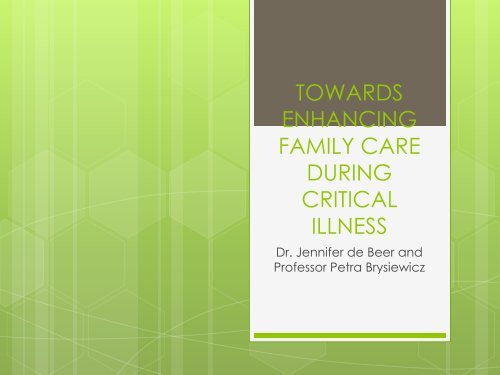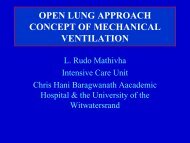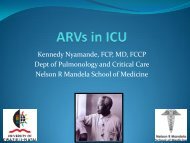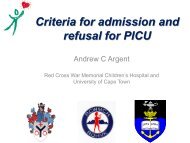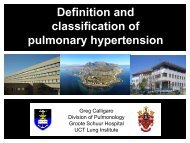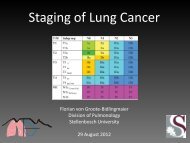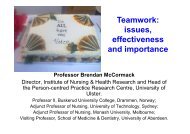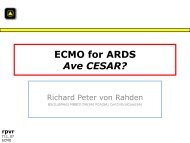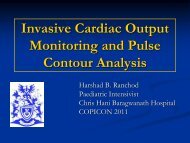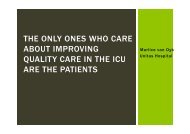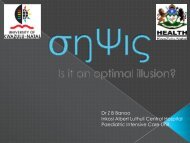Jennifer de Beer Enhancing family care during critical illness
Jennifer de Beer Enhancing family care during critical illness
Jennifer de Beer Enhancing family care during critical illness
Create successful ePaper yourself
Turn your PDF publications into a flip-book with our unique Google optimized e-Paper software.
BACKGROUNDThe process of hospitalization.The impact of hospitalization for<strong>family</strong> members.(Eggenberger and Nelms,2007).Family dynamics adverselyaffected. (Kanervisto, Paavilanen and Heikkila,2007).
PROBLEM STATEMENT Sud<strong>de</strong>n hospitalization is a catastrophicevent for <strong>family</strong> members (Sö<strong>de</strong>rström et al.,2009). Psychological crisis (Chien, Chiu, Lam et al.,2006). International studies: quantitative versusqualitative. Studies in South Africa limited. Internationally <strong>de</strong>veloped mo<strong>de</strong>ls inresource constraint South Africa.
PURPOSE AND OBJECTIVES The purpose -to explore <strong>family</strong> <strong>care</strong> <strong>during</strong><strong>critical</strong> <strong>illness</strong> and <strong>de</strong>velop a theory for theenhancement of such <strong>care</strong> in ICUs in Durban,KwaZulu-Natal, South Africa. To explore <strong>family</strong> members’ experiences of<strong>family</strong> <strong>care</strong> in the intensive <strong>care</strong> units; To explore the perceived needs of <strong>family</strong>members in the intensive <strong>care</strong> units; To explore the current practices of intensive<strong>care</strong> nurses and doctors in providing <strong>family</strong><strong>care</strong> in the intensive <strong>care</strong> units;
OBJECTIVES CONT. To distinguish between the limiting and theenabling practices as experienced by intensive<strong>care</strong> nurses and doctors in providing <strong>family</strong> <strong>care</strong> inthe intensive <strong>care</strong> units; To explore the meaning of <strong>family</strong> <strong>care</strong> asperceived by intensive <strong>care</strong> nurses, doctors and<strong>family</strong> members. To <strong>de</strong>velop a middle range theory towards theenhancement of <strong>family</strong> <strong>care</strong> in the intensive <strong>care</strong>units.
METHODOLOGYQualitative -Groun<strong>de</strong>d theory- Strauss and Corbin’s(1990) versionParadigm mo<strong>de</strong>l of Groun<strong>de</strong>d theory
SETTING , PARTICIPANTS ANDSAMPLING Intensive <strong>care</strong> units of the two hospitals inKZN Private versus public Participants: <strong>critical</strong> <strong>care</strong> nurses, doctorsand <strong>family</strong> members Sampling: convenient → theoreticalsampling
DATA COLLECTION Covert Observations: two monthsintermittently Document analysis: policies, memos,nursing and doctors notes In-<strong>de</strong>pth interviews Field notes Memos
Adapted from Gorra (2007).DATA ANALYSIS
SUMMARY OF FINDINGS Realization of sample of participants. 9 Family members- majority female 16 Nurses 7 Doctors
FINDINGS Conceptualization of the meaning <strong>family</strong> <strong>care</strong>: Ubuntu (togetherness): Ukubambisana (partnership): Ukuhlonipha (respect and dignity)“FC in South Africa means, togetherness, people first,ubuntu, also keeping people informed, where you takea total outsi<strong>de</strong>r as your <strong>family</strong>. When visitors enter theICU, they shouldn’t be regar<strong>de</strong>d as visitors but be partof the <strong>family</strong>, the ICU <strong>family</strong> because we all help eachother to cope…. We <strong>de</strong>al with the <strong>critical</strong> <strong>illness</strong> of thepatient together ….you treat each other as equalindividuals, creating a sense of harmony”
FINDINGS Sub concepts: Information sharing, Proximity Garnering of resources Cultural and religious co-operation Core concepts of theory: empowerment
INFORMATION SHARING Exchange of information Patient’s condition, treatment, prognosis,outcome. Technical milieu Honest factual, consistent Written information: pamphlets, <strong>family</strong>information booking.
PROXIMITY Flexibility in access to patient Physical and psychological closeness be mindful of the fact this should not betiring and draining for the patients andFMs.
GARNERING OF RESOURCES Material and non material Material : comfort, nutritional and privacyneeds Non- material: need to maintain hopeand need to share feelings of "suffering”with other.
CULTURAL AND RELIGIOUSCO-OPERATION Awareness, respect and acceptance Cultural context of families as well as ofthe ICU. Cultural biases and prejudices Professional and cultural conflicts Cultural knowledge and skill
EMPOWERMENT Of <strong>family</strong> members Health <strong>care</strong> professionals
PURPOSE OF THE THEORY Knowledge and guidance in the processof providing FC Enhance <strong>family</strong> <strong>care</strong> Shift from biomedical approach Family is acknowledge for their expertise Collaborative reciprocal relationships Promote cultural appropriate <strong>care</strong> Not restricted to <strong>critical</strong> <strong>care</strong>
Theory of Family Care During CriticalIllness
RECOMMENDATIONSNursing practice: Access to information. Conducting a <strong>family</strong> needs assessment. Family <strong>care</strong> coordinator.Nursing education Education regarding the theories andconcepts related to the phenomenon of<strong>family</strong> <strong>care</strong>. Culturally competent <strong>care</strong>.
RECOMMENDATIONS Nursing research: The Theory of Family Care During Critical Illnessshould be implemented and evaluated. Further, an investigation into the alternate supportservices available to FMs <strong>during</strong> <strong>critical</strong> <strong>illness</strong>especially within resource constraintsenvironments. An investigation in the cultural competence ofICNs. Exploring health <strong>care</strong> teams and communicationpatterns within the ICU setting.
THANK YOU


